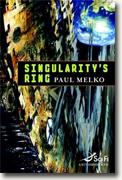Singularity's Ring
Paul Melko
book reviews:
· general fiction
· chick lit/romance
· sci-fi/fantasy
· graphic novels
· nonfiction
· audio books
· author interviews
· children's books @
curledupkids.com
· DVD reviews @
curledupdvd.com
newsletter
win books
buy online
links
home
for authors
& publishers
for reviewers

 |
Singularity's Ring Paul Melko Tor Hardcover 320 pages February 2008 |
|
Paul Melko’s debut novel is a great example of the joy science fiction can bring to its readers through its obsession with sheer possibility. Melko’s primary goal is to give us a completely novel experience of our humanity in the form of Apollo Papadopulos, a hive mind-body pod composed of five people, who pushes against our traditional understanding of what makes us individuals and what ties us to each other. Part thought experiment, part mystery adventure, Singularity’s Ring is a satisfying and enticing read, even if it never fully explores the implications of its own premises.
Apollo comprises Strom the strongman, Meda the communicator, Quant the autistic mathematician, Manuel the gymnast, and Moira the ethicist. For the first part of the book (most of its length) a single character narrates the story, for the most part episodically. If the symbolic names set off warning bells for you about clichéd storytelling styles, be prepared for a little of it, but far less than you fear. Each character has a distinct personality which is based in their contribution to Apollo but by no means limited to it. As the novel’s plot thickens and a few perspectives of storytelling have come and gone, the characters start to gel as individuals and as a unit. It becomes clearer just how they impact each other, how they rely on each other, and what parts of them are not included in the whole. Melko successfully makes a case for the viability of writing about a group personality. As the characters build on one another, the idea of a pod person becomes far more realistic and enticing. It’s unclear what ideas Melko is pushing in this unusual character-based novel. The episodic plot arcs focus on one member of Apollo splintering from the group, growing in some way, and then gladly rejoining the whole. At the end of the day, the pod is always good and natural (and when the novel brings in singleton characters, they seem oddly alien). How much should we believe this? Could pod life be a metaphor for something else? Do successful pods require episodes of group strife to truly be successful? Melko is silent on these questions, preferring to let Apollo speak for himself. We receive ideas and possibilities and do with them what we may. Given the rich variety of interpretations that can be made about the novel’s central themes, perhaps this silence is the best course of action. But in light of a fairly lackluster plot (the central mystery isn’t nearly as exciting or well-executed as the central premise) and a general absence of exploration of the premise’s themes, merely being presented with ideas isn’t quite enough. There’s a lot to make of Singularity's Ring But what Singularity's Ring Originally published on Curled Up With A Good Book at www.curledup.com. © Max Falkowitz, 2008 |
|
|
|
 Click here to learn more about this month's sponsor! |
|
| fiction · sf/f · comic books · nonfiction · audio newsletter · free book contest · buy books online review index · links · · authors & publishers reviewers |
|
| site by ELBO Computing Resources, Inc. | |
 In this future, 90% of humanity, members of the Community (a Matrix-like Internet where people jack into a distributed computing program for scientific progress) have died after a vaguely described Singularity. Their legacy consists of a fractured political world, amazingly advanced technology, and a massive ring that surrounds the planet, beaming down energy for the Singularity’s survivors but completely empty. With the exception of a few impoverished anti-technology types, society is composed of pods of joined individuals, genetically engineered to function as a single unit. Though each person has their own personalities (which often are deliberate extremes to make a balanced whole), their pheromone-based telepathy binds them to each other in groups from two to five. The Apollo pod is training to win command of the ship Consensus, a starship designed to explore the solar system in search of answers about the “Exodus” of the Community from Earth.
In this future, 90% of humanity, members of the Community (a Matrix-like Internet where people jack into a distributed computing program for scientific progress) have died after a vaguely described Singularity. Their legacy consists of a fractured political world, amazingly advanced technology, and a massive ring that surrounds the planet, beaming down energy for the Singularity’s survivors but completely empty. With the exception of a few impoverished anti-technology types, society is composed of pods of joined individuals, genetically engineered to function as a single unit. Though each person has their own personalities (which often are deliberate extremes to make a balanced whole), their pheromone-based telepathy binds them to each other in groups from two to five. The Apollo pod is training to win command of the ship Consensus, a starship designed to explore the solar system in search of answers about the “Exodus” of the Community from Earth.